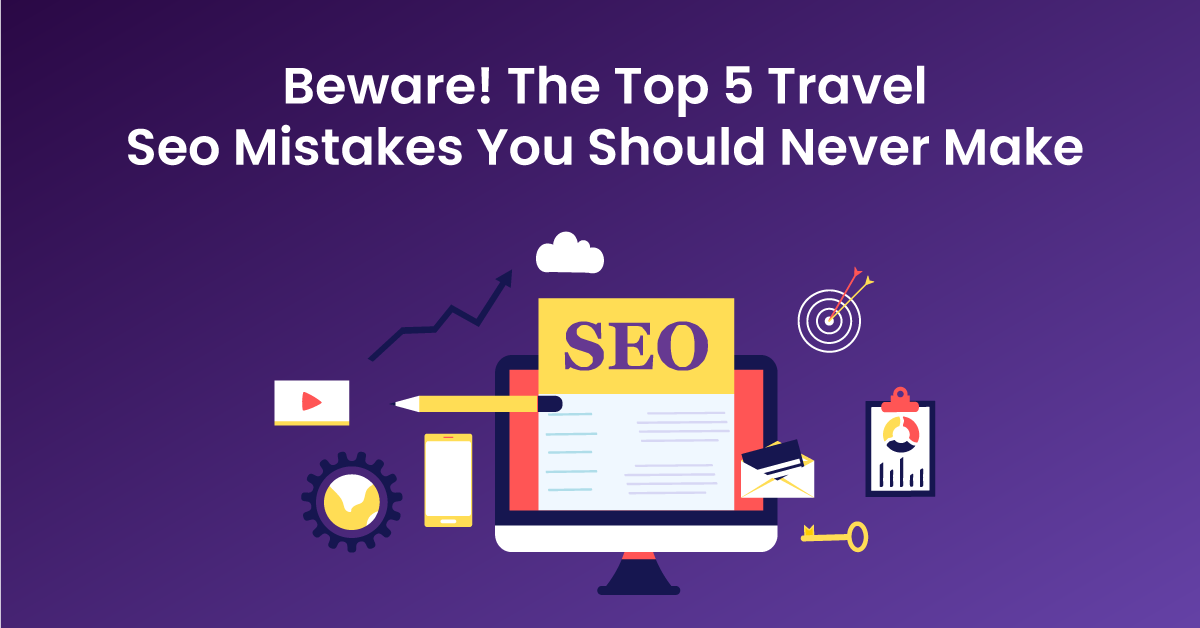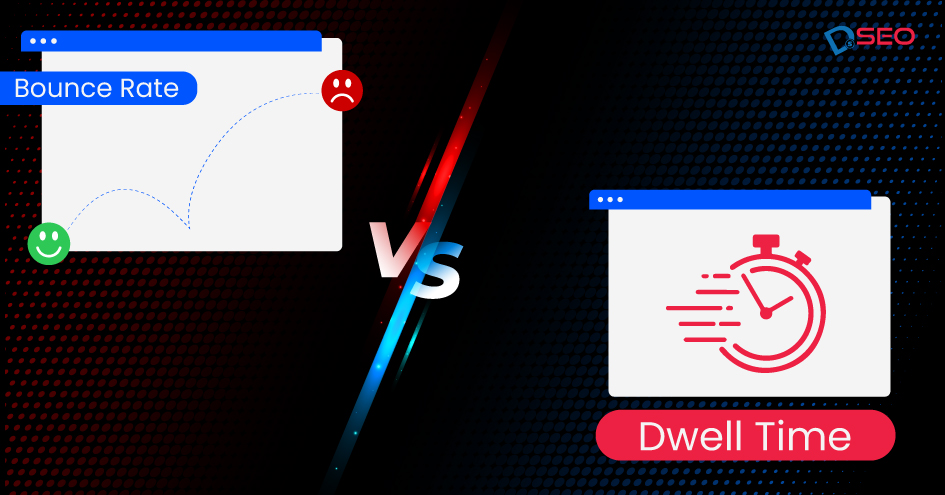
Beware! The Top 5 Travel SEO Mistakes You Should Never Make
July 15, 2023 / SEARCH ENGINE OPTIMIZATION
A strong online existence is vital for success in the competitive travel industry. Travel SEO, or search engine optimization, is vital in increasing your website’s visibility and driving organic traffic. By optimizing your travel website, you can reach a wider audience, attract potential customers, and outrank your competitors. This comprehensive guide will walk you through the top 5 travel SEO mistakes to avoid, helping you optimize your travel website effectively and achieve higher search rankings.
To optimize website successfully, it’s essential to be aware of common SEO pitfalls. This guide will highlight the top 5 mistakes that many travel businesses make. From neglecting keyword research and on-page optimization to overlooking mobile-friendly design, slow page loading speed, and local SEO, we’ll investigate each mistake and provide actionable tips to ensure your travel website stands out and attracts valuable organic traffic. Avoiding these mistakes will lead you to SEO success in the travel industry.
Mistake 1: Neglecting Keyword Research
Understanding the Role of Keywords in Travel SEO
Keywords are the foundation of effective travel SEO. They are the terms and phrases that users enter into search engines when looking for travel-related information, services, or products. Incorporating relevant keywords into your website’s content, meta tags, and headings increases the chances of your travel website appearing in search engine results. Keywords allow search engines to comprehend the relevance of your website to users’ queries, improving your visibility and organic traffic. Proper keyword research allows you to identify the most valuable and targeted keywords for your travel agency or services, ensuring your website is optimized for maximum exposure.
The Consequences of Not Conducting Thorough Keyword Research
Failing to conduct thorough keyword research for your travel website can have detrimental consequences. Without proper research, you may target keywords with low search volume or high competition, making it challenging for your website to rank well in search engine results. This means you miss out on potential organic traffic and lose valuable opportunities to attract customers. Refraining from keyword research also makes optimizing your website’s content challenging, as you may need to incorporate the correct terms and phrases that align with user search intent. By investing time in thorough keyword research, you can optimize your travel website with targeted keywords with optimal search volume and lower competition, maximizing your chances of ranking higher and attracting qualified visitors interested in your travel services.
Mistake 2: Ignoring On-Page Optimization
The Significance of Optimizing Title Tags, Meta Descriptions, and URLs
On-page optimization is a critical aspect of travel SEO that should be noticed. Optimizing title tags, meta descriptions, and URLs ensures that search engines understand the relevance and content of your web pages. Title tags should include targeted keywords and accurately describe the page’s content. Meta descriptions provide a concise summary and should attract users to connect to your website. URLs should be clean and descriptive and include relevant keywords for better search engine visibility. By optimizing these elements, you enhance the chances of search engines ranking your travel website higher in search results, driving organic traffic and attracting potential customers interested in your services.
Overlooking the Importance of High-Quality Content and Internal Linking
High-quality content and internal linking play crucial roles in on-page optimization. Creating informative, engaging, and unique content satisfies users and demonstrates your expertise and authority in the travel industry. Incorporating relevant keywords naturally within your content enhances its visibility to search engines. Internal linking within your website also helps search engines discover and navigate your pages, improving overall website structure and user experience. It also helps distribute link authority across pages, boosting their search rankings. You optimize your travel website for better search engine visibility, user engagement, and increased organic traffic by focusing on high-quality content and strategic internal linking.
Mistake 3: Lack of Mobile-Friendly Design

The Increasing Prevalence of Mobile Browsing in the Travel Industry
Mobile browsing has become increasingly prevalent in the travel industry, with more and more users using smartphones and tablets to search for travel information, plan trips, and make bookings. Travel websites need a mobile-friendly design to cater to this growing segment of users. By optimizing your travel website for mobile devices, you can provide seamless and enjoyable browsing knowledge, guaranteeing that users can easily navigate your site, access information, and complete bookings on the go.
How Non-Responsive Design Affects User Experience and SEO Rankings
A lack of mobile-friendly or responsive design negatively impacts user experience and SEO rankings. Non-responsive websites are challenging to navigate on mobile devices, leading to frustrated users who may quickly abandon the site in favor of a competitor’s mobile-friendly website. Additionally, search engines prioritize mobile-friendly websites in their rankings, favoring those that provide a positive user experience across devices. By neglecting mobile-friendly design, your travel website may suffer from lower rankings in search results, reduced organic traffic, and missed opportunities to attract and engage potential customers.
Mistake 4: Slow Page Loading Speed
The Impact of Slow Loading Speed on User Satisfaction and Search Rankings
Slow page loading speed can significantly impact user satisfaction and overall search rankings for your travel website. Users expect websites to load quickly, and when pages take less time, it leads to satisfaction and a better user experience. Visitors may abandon the site and turn to competitors with faster-loading pages. Moreover, search engines prioritize user experience and consider page loading speed a ranking factor. If your travel website has a slow loading speed, it may negatively impact your SEO efforts and result in lower search rankings, reducing organic traffic and potential customers.
Tips and Techniques for Optimizing Page Loading Speed
Consider implementing tips and techniques to optimize your travel website’s page loading speed. Compress images and optimize file sizes to reduce load times. Minify CSS and JavaScript files to remove unnecessary code and improve efficiency. Leverage browser caching to store static resources and enable faster subsequent page loads. Use a content delivery network to spread content across numerous servers globally, reducing latency. Implement lazy loading techniques to defer the loading of below-the-fold content. Lastly, regularly monitor and optimize your website’s performance to ensure consistent fast-loading speeds.
Mistake 5: Neglecting Local SEO

Understanding the Importance of Local SEO for Travel Businesses
Local SEO is vital for travel businesses as it helps you target potential customers in specific locations. Many travelers search for local attractions, accommodations, and services when planning their trips. Optimizing your travel website for local SEO allows you to appear in relevant local search results, increasing your visibility and attracting potential customers actively seeking services in your area. By paying attention to local SEO, you miss valuable opportunities to connect with travelers and establish a strong presence in your target market.
Strategies for Improving Local Visibility, Such as Claiming Google My Business Listings
To improve local visibility for your travel business, several practical strategies exist. Begin by optimizing your Google My Business listing, providing accurate and up-to-date information about your business. This allows you to appear in local search results, display customer reviews, and showcase your services. Optimize your website’s content with local keywords, ensuring that you mention your location and relevant landmarks. Create location-specific landing pages or blog posts to target specific regions. Encourage customer reviews and engage with them to build trust and credibility. List your business on relevant local directories and engage in local link-building efforts. These strategies will enhance your local SEO efforts, helping your travel business gain visibility and attract local customers.
Conclusion
Avoiding these travel SEO mistakes is essential for long-term success in the competitive travel industry. These strategies will help you attract potential customers, establish authority, and stand out from competitors. Now is the time to take your travel business to new heights with Deftsoft’s cutting-edge SEO services for travel industry. As customers increasingly rely on Google to find travel agencies and websites, our expert team will optimize your online presence, attracting potential leads and driving bookings. Contact Deftsoft today and unlock the power of travel SEO for your business’s success.









